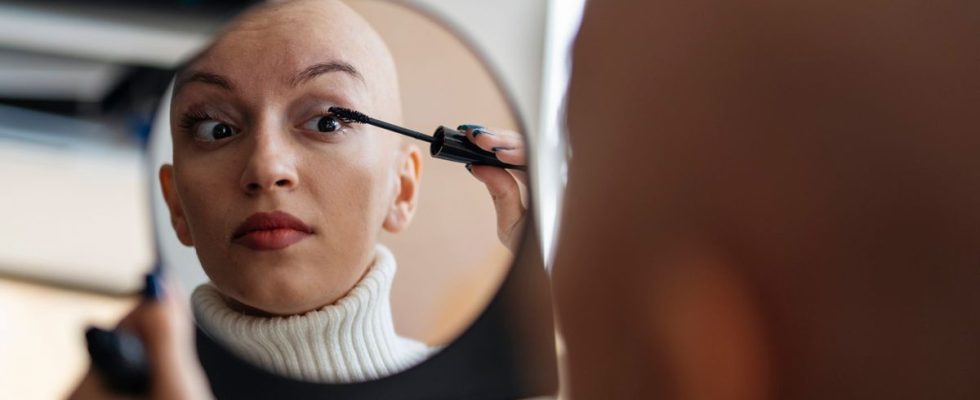Published on
Updated
Reading 4 min.
Helping women with cancer to cope with the physical and psychological upheavals caused by the disease and its treatment. This is today the role entrusted to aesthetic care, vectors of well-being, self-esteem, and calming, for the patients concerned. On the occasion of World Cancer Day, February 4, focus on socio-aesthetics, a practice today considered essential in the healing process.
“In the overall care of people weakened by life or illness, implemented by medical and social professionals, socio-aesthetics is a complementary action which contributes to bodily support for suffering and pain through listening and touching for better well-being, reconstitution of self-image – and therefore self-esteem, and resocialization to restore confidence in reaching out to others“. It is in these terms that Guillaume Adam, general delegate of the Belle & Bien association, defines this practice which meets the needs of women weakened by illness, disability, old age, or in social distress.
Beauty in the service of illness
Hair loss, dryness and rashes, hyperpigmentation of the skin, allergies, damaged nails: cancer treatments can cause many physical side effects, which can themselves impact the well-being of patients, already damaged by the disease. and the care pathway. It is on these two levels, physical and psychological, that the Belle & Bien association focuses, founded in 2001, and considered the pioneer in socio-aesthetics, and more specifically onco-aesthetics.
The association’s hundred or so volunteer beauticians and companions work daily to promote the well-being and better living of the patients concerned. This translates into free onco-aesthetic classes and workshops within its treatment salon, located in Paris, and partner hospitals throughout France. At stake ? Treatments and advice – facials, makeup, self-massages – which not only allow these women to feel better, but also to learn techniques that they can reproduce on their own to regain self-confidence and better deal with the side effects of treatments and illness.
“Cosmetics are not only products intended to improve appearance, they also allow you to take care of yourself, relax and feel good about yourself.“, explains Emmanuelle, one of the beneficiaries of these workshops. And adds: “They helped me reclaim my image and feel more comfortable despite the physical changes caused by the treatments“.
Informed of the existence of the association by her medical team, Emmanuelle is as nervous as she is curious, and impatient, at the idea of discovering these workshops which, not content with having helped her regain self-confidence, have also given her offered some form of support. “I am extremely grateful for these workshops. They helped me feel more confident. I learned techniques to take care of my skin, and I also had the opportunity to meet other women who are going through the same ordeal as me. These workshops were a source of support and comfort during this difficult time“, she confides.
“A real breath of fresh air”
Like the approximately 4,600 people who benefit from these workshops each year, Emmanuelle learned to perform facial hydration treatments, to apply makeup to achieve a healthy glow, and to take care of her hands and nails. And if these workshops allowed him to reconnect with his body, and to better manage the side effects of the treatment, they also represented “a real breath of fresh air” on a mental level. “They gave me a space to relax and focus on myself, away from the constraints and stress of my treatment“, she explains.
Benefits, both physical and psychological, highlighted by the vast majority of patients who have already had the opportunity to experience these specific treatments. A survey, conducted between September 2022 and June 2023 among 338 women who participated in a Belle & Bien workshop or class, shows that more than nine out of ten beneficiaries felt the positive effects of skincare and/or makeup products on their self-confidence. The workshops proved beneficial for the well-being (77%) and confidence (23%) of many participants. According to Guillaume Adam, “these figures demonstrate that the workshops and treatments help women to become aware of the importance of taking care of themselves on a daily basis, which contributes to their well-being and self-confidence“.
Integral part of the care pathway
The impact of these treatments and these workshops proves even more important, even beyond the therapeutic effects felt. Like a snowball effect, they also make it possible to improve the quality of hospitalization for patients, and to (re)find the strength to face the illness. “The study also highlights that ‘taking care of yourself’ can be a means of resilience in the face of illness. The workshops allow women to reclaim their bodies and regain a feeling of control. Taking care of yourself can help patients adhere to medical recommendations and cope better with treatments“, observes the general director of the association.
For Emmanuelle, this support via cosmetics is also essential in the healing process. “I used to think that cancer treatment was limited to medical interventions, such as surgery, chemotherapy or radiotherapy. But thanks to this workshop, I realized that physical and psychological well-being also play a crucial role in the healing process. Like other physical activity support care or nutritional advice“.
Recognized in France as “supportive oncological care”, which includes “all the care and support necessary for sick people throughout the illness” according to the National Cancer Institutesocio-aesthetic care is provided by numerous associations, like Beautiful & Good, Cosmetic Executive Women, Rose Upor Awakening of the Senses, among others, or even by independent socio-estheticians. If it is mainly about care and makeup, whether to combat dry skin or hide a scar, women can also be given advice on wearing a scarf or a wig, among other things. others. Everything is done to help women cope better with the upheavals caused by the disease.
